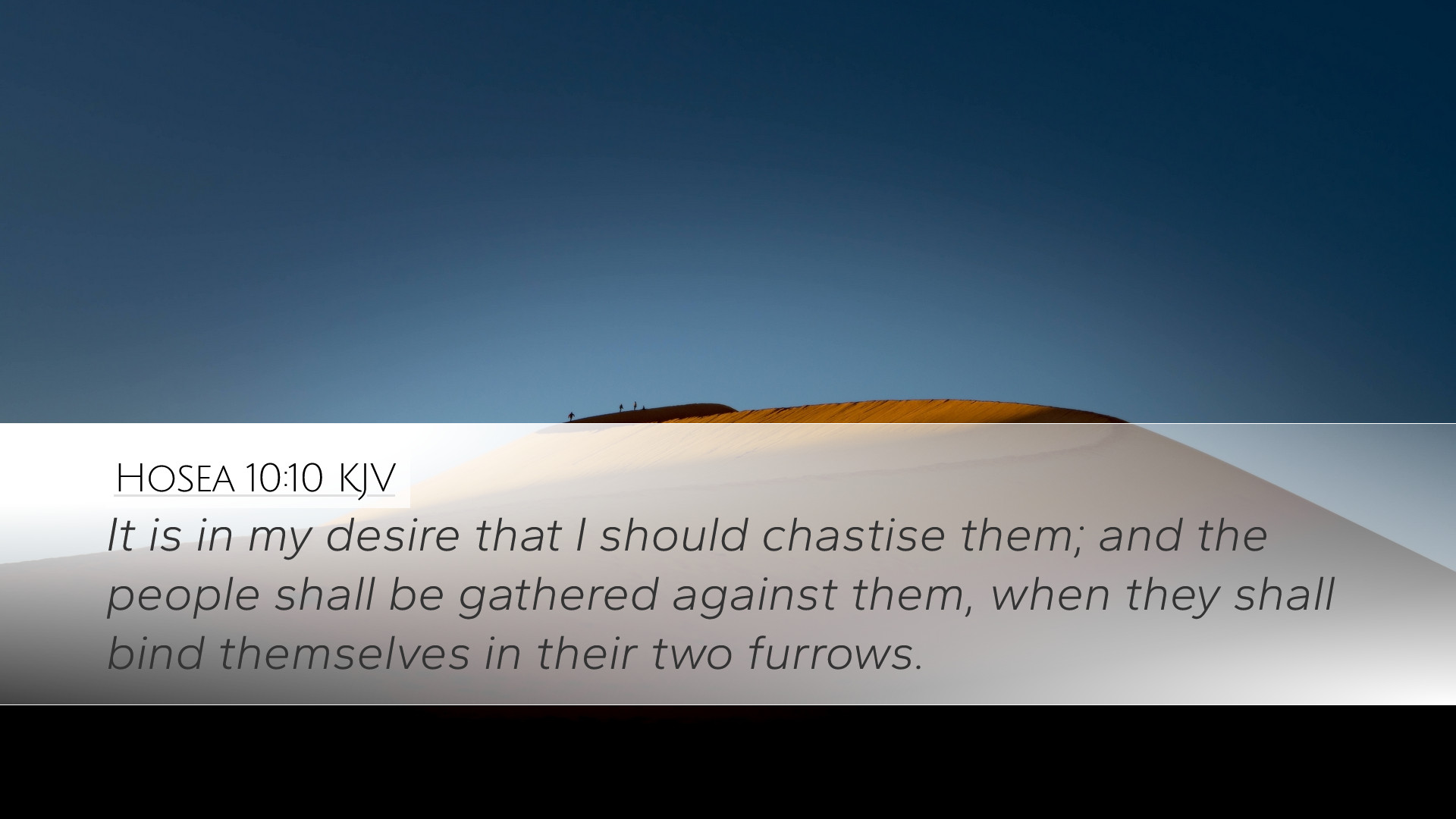Old Testament
Genesis Exodus Leviticus Numbers Deuteronomy Joshua Judges Ruth 1 Samuel 2 Samuel 1 Kings 2 Kings 1 Chronicles 2 Chronicles Ezra Nehemiah Esther Job Psalms Proverbs Ecclesiastes Song of Solomon Isaiah Jeremiah Lamentations Ezekiel Daniel Hosea Joel Amos Obadiah Jonah Micah Nahum Habakkuk Zephaniah Haggai Zechariah MalachiHosea 10:10
Hosea 10:10 KJV
It is in my desire that I should chastise them; and the people shall be gathered against them, when they shall bind themselves in their two furrows.
Hosea 10:10 Bible Commentary
Bible Commentary on Hosea 10:10
Verse Reference: Hosea 10:10 (ESV): "When I please, I will discipline them; and the peoples shall be gathered against them when I bind up their two transgressions."
Introduction
Hosea, the prophet of the Northern Kingdom of Israel, presents a poignant message in this verse that captures the nature of God's sovereignty and the reality of human disobedience. Understanding this text requires digging deep into its context, implications, and the historical circumstances surrounding Hosea's ministry. In this commentary, insights from Matthew Henry, Albert Barnes, and Adam Clarke will be woven together to illuminate the depth of this passage for modern theologians, pastors, and students of the Bible.
Context of Hosea
The Book of Hosea stands as a significant prophetic work, particularly in its exploration of Israel's infidelity to God. Hosea’s life and message serve as a critical reminder of God’s love and judgment, encapsulating the themes of repentance, restoration, and divine discipline.
Matthew Henry observes that Hosea speaks during a tumultuous period, heavily laden with idolatry and covenant unfaithfulness. This context is vital for interpreting the harsh realities of God’s impending judgment as articulated in 10:10.
Analysis of Hosea 10:10
The verse comprises several key elements that merit attention: divine discipline, gathering of the peoples, and the reference to transgressions. Each component enriches our understanding of God’s character and His dealings with His people.
Divine Discipline
The phrase "When I please, I will discipline them" signifies the sovereign authority of God in the enforcement of His will. Albert Barnes emphasizes that discipline emerges not out of random judgment but out of a profound purpose which aligns with God’s holiness and justice. This discipline serves as both corrective and restorative, aiming to bring the erring back into right relationship with God.
The Gathering of the Peoples
The latter part of the verse forewarns the gathering of peoples against Israel. Adam Clarke highlights this gathering as indicative of impending conflict and the coalition of nations that might arise in reaction to Israel's unfaithfulness. This reflects both a literal and metaphorical gathering, where external nations symbolize the consequences of Israel’s actions.
Transgressions and Their Impact
"When I bind up their two transgressions" refers to the multi-faceted nature of sin. Matthew Henry explains that transgressions can be understood both as offences against God and interpersonal injustices. Hosea alludes not just to the sins of the people but the compounding effect of these sins that leads to societal upheaval and divine withdrawal.
Theological Implications
This verse provides profound theological insights relevant for today's believers, calling for both introspection and action.
- The Sovereignty of God: The assurance that God acts according to His will suggests a robust theology of sovereignty. God’s timing and method of discipline are purposeful and should evoke reverence.
- The Nature of Divine Discipline: It showcases God's love through discipline, portraying a God who cares enough to correct. This invites reflection on the necessity of discipline in contemporary Christian life.
- The Reality of Sin: The mention of transgressions reminds readers of the seriousness of sin. There is a call towards personal and corporate repentance, recognizing the weight of moral and spiritual failures.
- Consequences of Unfaithfulness: The gathering of peoples acts as a warning that nations, communities, and individuals alike can face repercussions for turning away from God. It aligns with the biblical principle of sowing and reaping as expressed in Galatians 6:7.
- Hope for Restoration: The verse, while filled with judgment, implicitly carries the hope of restoration. The notion of binding suggests healing for those who turn back to God. This points to the overarching message of the gospel.
- Corporate and Individual Accountability: The gathering indicates that sin impacts not just the individual but the community at large, urging corporate responsibility for moral and spiritual integrity.
- Alertness to God’s Timing: The phrase “When I please” serves as a reminder that God’s actions may operate in His time and not ours, calling believers to patience and trust in divine timing.
- The Call for Prophetic Voices: Just as Hosea was used to deliver this message, contemporary believers are encouraged to be prophetic in their own contexts, addressing both personal and communal sin.
- Understanding God's Character: The balance of discipline and mercy reveals a complex divine character that stresses both love for humanity and holiness that cannot overlook sin.
- Literary and Poetic Elements: Hosea's writing style, which includes metaphors and poetic structures, encourages readers to engage with the text on deeper levels, discerning meaning through literary devices.
- The Kingdom of God: The consequences discussed foreshadow the eventual establishment of God's kingdom where His justice will be perfect, pointing to eschatological hope.
- Personal Application: Individual believers are challenged to reflect on their transgressions and seek God’s discipline as a pathway to spiritual growth and renewal.
- The Unity of Scripture: Hosea 10:10 resonates with themes found throughout Scripture regarding sin, judgment, and redemption, bridging prophetic literature with other biblical writings.
- The Call to Evangelism: Understanding the consequences of turning away from God heightens the urgency of sharing the gospel, encouraging individuals and communities to turn toward Christ for salvation.
- Challenge for Theologians: Scholars are invited to wrestle with the implications of divine justice in light of contemporary issues facing the church and culture today.
- The Role of the Church: The Church serves as a bastion of hope, guiding individuals back to the truth of God amidst a world that resists His will.
- The Power of Repentance: The opportunity for healing and restoration through repentance reinforces the grace available to all who turn back to God, making it a central tenet of Christian faith.
- Engagement with God’s Word: Finally, this verse emphasizes the necessity of a robust engagement with Scripture, essential for discerning God’s voice in the context of personal and communal life.
Conclusion
Hosea 10:10 encapsulates the profound truths of divine discipline, communal accountability, and the hope for restoration, all articulated through the lens of prophetic warning. The insights drawn from public domain commentaries reinforce the depth of God’s character and His unfolding plan for His people. As we navigate our contemporary context, this passage serves as a timeless reminder of the importance of remaining faithful to God, embracing His discipline, and seeking restoration through repentance.


